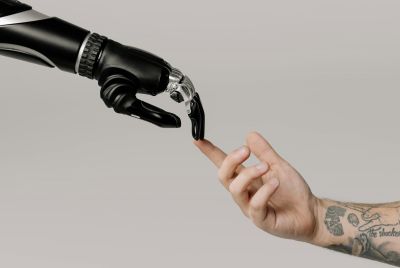This revolutionary new technology can use the way you walk as a password
New tech branded 'one of the most promising solutions for user authentication.'

The humble eight-digit password may soon be a thing of the past. Research released this week (24 May) shows computer scientists have developed an innovative new technology which has the potential to use the unique way a person walks to unlock devices.
The breakthrough, from Australian Commonwealth Scientific and Industrial Research Organisation's (CSIROs) Data61 lab, has been called "one of the most promising solutions for user authentication" which offers "several advantages" over other forms of biometric technology.
Data61 experts developed a prototype wearable device to capture how a person's gait and "unique energy generation pattern" can be used as a form of password.
The latest technique uses a process called kinetic energy harvesting (KEH) which turns your motion into electrical energy it can also be used to fuel wearable products.
"By applying both techniques we have developed a way to achieve two goals at once - powering devices and the ability to verify a person's identity using a wearable device by capturing the energy generated from the way they walk," Data61 researcher Sara Khalifa said in a statement.
The research name-checked specific brands, including Fitbit and Apple Watch, which already monitor a user's vitals. The computer scientists argue that using gait as a form of authentication (with the help of internal sensors) is likely the next step in password evolution.
The team's research paper claims it has the ability to revolutionise the use of wearables in "health monitoring and medical assistance."
Of course, the key to strong authentication is how well it fends off hackers, cybercriminals and break-in attempts. To test the security of KEH the researchers conducted a trial on 20 users, with data being collected using two different settings from a range of environments and floor surfaces.
Data61 said the results of the trial were promising – achieving an authentication accuracy rate of 95%. During another test, which gauged how hackers may try and imitate a target's motions, researchers found that 13 out of 100 "imposter trials" were successful.
"Because walking is a daily activity, the main advantages of gait are its availability and spontaneity. Furthermore, gait is non-intrusive, and can be measured without subject intervention or knowledge.This motivates us using gait as a biometric," the full research paper stated.
It added: "The feasibility of the proposed idea is based on the observation that if humans have unique walking patterns, then the corresponding patterns of harvested power from KEH should be unique too." One potential downside remains clear: what happens if you are not moving?
Professor Dali Kafaar, a Data61 group research leader, outlined a number of benefits of gait technology over passwords, fingerprints or other forms of traditional techniques.
He said in a statement: "Firstly, it is convenient because as we walk around each day our gait can be sampled continuously and verified without us having to manually adjust anything.
"Secondly, it's more secure than passwords because the way we walk is difficult to mimic. Since KEH-gait keeps authenticating the user continuously, it collects a significant amount of information about our movements, making it difficult to imitate or hack unlike guessing passwords or pin codes."
The research team claimed gait monitoring is not the only form of authentication research it is undertaking. It is also reportedly exploring "unique breathing patterns" and "distinctive behavioural biometrics from the way users innately interact with their devices" as other options.
© Copyright IBTimes 2025. All rights reserved.






















